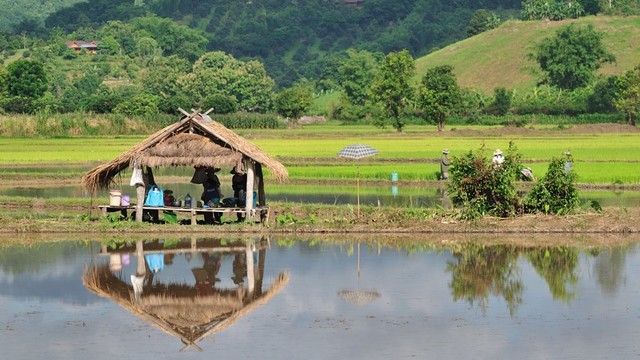All over the world citizens are starting to demand accountability from those in power. We are seeing exciting experiments in participatory governance. But are they working for young people? And what spaces are most promising for the participation of children and youth?
Across Africa, youth (particularly boys and young men) are often seen as a ‘lost generation’: frustrated, excluded and marginalised from decision-making processes. Young Africans make up more than half of the continent’s population. Yet for decades – even generations – governments have been ignoring and silencing young voices.
But a new book published today from IIED demonstrates how this is changing.
It examines why it is so important that young Africans are beginning to step up to the challenges of engaging in governance and policy making processes – and claiming their rights as young citizens.
According to editors McGee and Greenhalf, “If policies, plans and budgets are to be relevant to youth, they also need to be informed by their realities, priorities and perspectives.”
“Yet – until now – little documentation focuses on young people’s perspectives and roles in governance processes. But young people are starting to drive change in creative and unexpected ways. There is much to learn from the ways that they are challenging norms and structures that exclude them, engaging with the state and demanding accountability.”
Participating in policy making and governance is starting to re-shape the way young Africans perceive and exercise citizenship in powerful ways. This book examines how young people in Africa are starting to exercise their right to participate – and developing the knowledge, skills and confidence to affect to change.
Emerging participatory processes such as social accountability do offer young people new openings to engage in governance processes. But as guest editors Rosemary McGee and Jessica Greenhalf also caution, “Exciting as these new approaches are, we need to look harder at them. Some voices, including those of young people, often get left out, just as they do from formal, electoral and political processes.”
McGee and Greenhalf argue that we need to know more about why this is and how it can be overcome. “As young people move from childhood to adulthood, it has implications for the ways young people’s needs and interests are represented and pursued. It also affects the opportunities they have to exercise citizenship and realise their rights.”
Ultimately, young people’s participation in governance needs to be seen not just as an end in itself, but as a means to bring about more sustainable, progressive change – for young and old alike.
Young citizens: youth and participatory governance in Africa is the latest issue of IIED’s Participatory Learning and Action series. And it demonstrates the persistence, passion and enthusiasm that young people bring to governance processes.
The issue was developed and written by and with young people and reflects on successes, questions and challenges. It includes 19 case studies about young people’s engagement in participatory governance across Africa. The articles were developed during a week-long writeshop in Nairobi, Kenya in March 2011 and cover 4 broad themes:
From youth presence and voice to youth influence and rights
Rejuvenating spaces for engagement
Learning citizenship young
Power to young people
To mark the launch of the book – Young citizens: youth and participatory governance in Africa – the IIED PLA series co-editors, Plan UK and the Institute of Development Studies (IDS) invite bloggers to share their blog posts about the book.
Once you have posted a blog on your own site please send the link to: holly.ashley@iied.org
We will then profile the best posts via Twitter with the hashtag #pla64
Downloads and links
Issue 64: Young citizens: youth and participatory governance in Africa
Participatory Learning and Action series, IIED, 2011
Guest editors: Rosemary McGee and Jessica Greenhalf
Series editors: Holly Ashley, Nicole Kenton and Angela Milligan
Price: USD $32.00 Paperback, 232 pages
Order number: 14607IIED ISBN: 978-1-84369-829-6
Download the complete issue
Table of contents
Abstracts
African youth in participatory politics - article
Download the flyer
Contact
Holly Ashley, PLA co-editor
Email: holly.ashley@iied.org
Telephone +44 (0)20 3463 7399
Notes to editors
The International Institute for Environment and Development (IIED) is an independent, non-profit research institute. Set up in 1971 and based in London, IIED provides expertise and leadership in researching and achieving sustainable development (see: www.iied.org).
About the guest editors
Rosemary McGee is a research fellow in the Participation, Power and Social Change Team at the Institute of Development Studies (IDS), University of Sussex, UK. Jessica Greenhalf is a former member of Plan UK’s governance team and now works with Restless Development Uganda, a youth-led development NGO.
About Participatory Learning and Action
Participatory Learning and Action is the world’s leading informal journal on participatory approaches and methods. It draws on the expertise of guest editors to provide up-to-the minute accounts of participatory approaches in specific fields. Since 1987, PLA has provided a forum for participatory practitioners – community workers, activists and researchers – to share experiences, conceptual reflections and methodological innovations with others, providing a genuine ‘voice from the field’. Published twice a year, it is a vital resource for those working to enhance the participation of ordinary people in local, regional, national and international decision-making, in both South and North.



